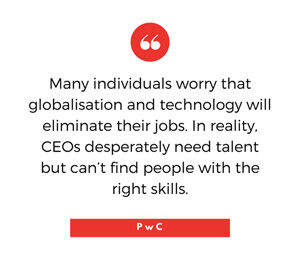UK CEOs concerned about soaring employee skill gap
The latest PwC CEO survey highlights the likelihood of skills shortages by 2022. The Open University focuses on the need for education. And Jaguar Land Rover invests in training for future generations.

https://www.pwc.com/gx/en/ceo-agenda/ceosurvey.html
Who was interviewed for the PwC survey?
- 1,379 CEOs from 79 countries
- 120 UK CEOs
What are the CEOs' chief employment and business concerns?
77 percent of CEOs surveyed see availability of key skills as their chief issue. This ranked it just behind:- uncertain economic growth (82 per cent)
- over-regulation (80 per cent)

83 percent of surveyed CEOs say that they were ‘somewhat’ or ‘extremely’ concerned about access to talent. These results come in the context of current UK trends which suggest that technology will drive a shift from low-skill, routine occupations to higher-skill, agile roles, meaning it's likely that there will be a UK labour market deficit in highly skilled areas.If current trends continue, the UK will have a total of 15 million high-skill jobs by 2022, leaving a shortage of three million high-skilled workers. According to the government’s State of the Nation report, falling demand for low-skilled individuals over the same period could see nine million people chasing just four million jobs.
Related articles:
- The big picture for business: Relocate’s perspective
- Facebook and Google suggest how UK businesses can prosper post-Brexit
- CIPD 2016: The future of the professions?
- UK government trails new plan to help retain older workers
Needed: More technologically savvy employees
In a separate analysis, PwC surveyed more than 5,000 members of the public in 22 countries. Their findings show that 79% believe technology will cause job losses over the next five years.However, the report notes that “CEOs still need people” with only 16 per cent of CEOs planning to “cut their company’s headcount over the next 12 months” and with only one quarter of them saying that would be primarily because of technological changes.The report continues, “CEOs see the value of marrying technology with uniquely human capabilities. The skills they consider most important are those that can’t be replicated by machines.”Skills overlap and competition for employees
Francesco Venturini, CEO of Enel Green Power in Italy, describes the future landscape as he sees it. “I think that the biggest change that I see happening in the next 20 years is that there is going to be big overlapping among the different industries. So, there is going to be fierce competition among the mature industries – for example, telecoms will fight with energy companies, energy companies will fight with the automotive companies, and so on.”The Open University: Skills training the key to talent management and employee success
The Open University emphasises that urgent change is needed to ensure progression from low to higher skilled occupations is open to all.Steve Hill, External Engagement Director at The Open University, notes, “As we consider what the heralded Industry 4.0 means for our future workforce needs, there is certainly encouragement from the fact that our economy is seeing growth in high-skill areas. The shape of our labour force must change to meet business requirements. We need to consider fully the impact on individuals, businesses and the economy as a whole if we fail to open up opportunities for progression to those currently locked into low-skill roles.”Download our Leadership and management development factsheet On the topic of training, he noted that there are options which “extend beyond the classroom” - for example, higher and degree apprenticeships – which “have a key part to play, since they give individuals a chance to learn relevant, work-based skills whilst earning.”Hill continues, “Creating a high-skill workforce across the UK is key to boosting growth in all regions, particularly those that are currently suffering the severest skills shortages. By taking full advantage of the flexibility afforded by supported online learning delivery, businesses can access the highest-quality training material for their employees, no matter where they are based in the country.”Jaguar Land Rover's approach to engaging talent for the future
Jaguar Land Rover is the UK’s leading investor in automotive research and development. Because of a predicted shortfall of 200,000 qualified engineers in the UK by 2020, the company is working with government and other agencies to find ways to address this. Jaguar Land Rover has also created the Tomorrow’s Engineers (ITE) programme to promote learning and engagement with STEM (science, technology, engineering and maths) subjects. The aim of this initiative is to encourage young people to consider careers in engineering or manufacturing.Jaguar Land Rover initiatives, which engaged 300,000 students globally in 2015, are joined by a range of opportunities for older students, such as apprenticeship programmes, graduate training schemes, and partnerships with universities and colleges.More related articles:
- Jaguar Land Rover – inspiring tomorrow’s skills today
- Is talent flexibility as we know it at breaking point?
- Companies voice fears over post-Brexit skills gap
Read the latest PwC CEO survey report
For related news and features, see our leadership & management section.
Access hundreds of global services and suppliers in our Online Directory Subscribe now to our Global Mobility Toolkit
Subscribe now to our Global Mobility Toolkit 




































